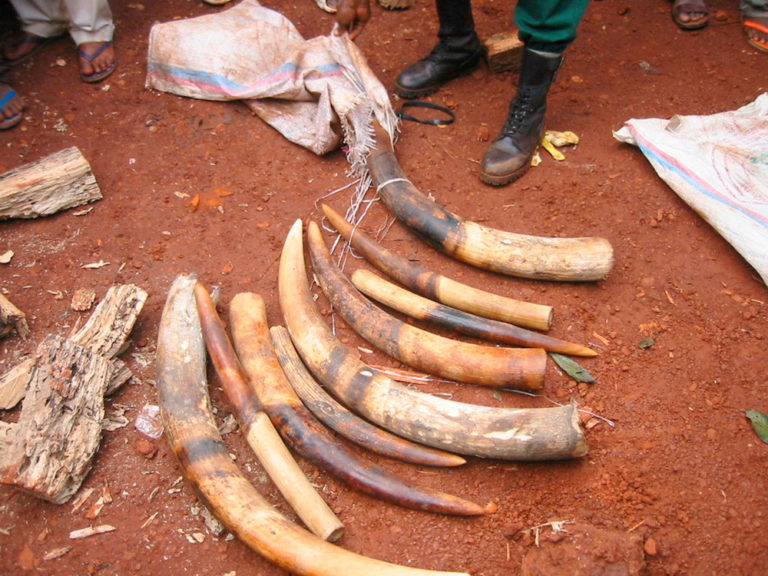Wildlife trafficking: FG destroys $9.9bn worth of ivory
The Federal Government of Nigeria in collaboration with other stakeholders has destroyed 2, 436.15 kilogrammes of seized ivory worth $9.9billion in a bid to combat illicit trade in wildlife which has threatened the country’s rich biodiversity. Nigeria has been identified as a major transit hub for trafficking of wildlife products, including ivory which has further […]

Sized elephant tusks in the East of Cameroon. Long viewed as a valuable commodity the illegal killing of elephants for ivory and meat has been identified as one of the species’ major threats. The Central Africa region is the principal source of illegal ivory in trade today.
The Federal Government of Nigeria in collaboration with other stakeholders has destroyed 2, 436.15 kilogrammes of seized ivory worth $9.9billion in a bid to combat illicit trade in wildlife which has threatened the country’s rich biodiversity.
Nigeria has been identified as a major transit hub for trafficking of wildlife products, including ivory which has further threatened the survival of endangered species like elephants.
Daily Trust gathered that the crushing of the ivory in Abuja yesterday was a big push to curb the illegal ivory trade and protect the dwindling elephant population. And it is the first-ever ivory crush where significant stockpiles of confiscated elephant tusks and worked ivory weighing approximately 2.5 tonnes (2,436.15 kilogrammes) were publicly destroyed.
The crushing was carried out by the National Environmental Standards and Regulations Enforcement Agency (NESREA) in collaboration with the Elephant Protection Initiative Foundation (EPIF).
- Maritime workers shelve plan to shut down port, terminals
- Nigeria’s per capita income to reach pre-pandemic level in 2025 – World Bank
Speaking during the exercise, the Minister of State for Environment, Dr Iziak Salako, said, “We are proud to stand at the forefront of the fight against the illegal ivory trade. Today’s ivory crush is a symbol of Nigeria’s unwavering commitment to wildlife conservation and the protection of our natural heritage. By destroying these confiscated ivory stockpiles, we send a strong message that wildlife trafficking will not be tolerated in our country.
“Nigeria is taking a firm stance, and we call on the global community to join hands in eradicating this illicit trade that threatens the very existence of our elephants.”
On his part, the Director General/ Chief Executive Officer of NESREA, Professor Aliyu Jauro, said Nigeria will do everything it takes to eradicate illicit wildlife trade which threatens the country’s conservation efforts.
“The destruction of the confiscated ivory is a tangible step towards stamping out wildlife trafficking. We stand united against the illegal ivory trade, and our actions today are not only crucial in preserving the majestic elephants for future generations but also in sending a clear message that Nigeria will do whatever it takes to protect our elephants and other endangered wildlife,” he said.
According to Elephant Protection Initiative (EPIF), illegal ivory trade poses a severe threat to elephant populations across Africa, contributing to a steep decline in numbers of the majestic creatures which are one of the symbols of Africa’s rich natural endowment, with the trade also fuelling organised crime on the continent.
Daily Trust can report that tens of thousands of elephants are killed each year for their tusks, despite a ban on the international trade in ivory since 1989 by the UN Convention on International Trade in Endangered Species of Wild Fauna and Flora (CITES).
The most recent African Elephant Status Report estimates that about 415,000 elephants remain in Africa today compared to over 1.3 million elephants found in the continent in 1979. As few as 400 remain today in Nigeria.
The Chief Executive Officer (CEO) of EPIF, John Scanlon, said, “The Elephant Protection Initiative is honoured to stand with the government of Nigeria at today’s ivory crush. The destruction of confiscated elephant ivory in Abuja will not, in itself, put an end to the trafficking of elephant ivory. It will, however, ensure that no one will ever profit from this contraband. When coupled with the recent seizures of ivory and the prosecution and conviction of offenders, it also sends a powerful message that Nigeria does not tolerate this illegal trade, and is taking important steps to protect its remaining elephant population. We look forward to continuing our support to Nigeria with stockpile management and other conservation-related issues.”
